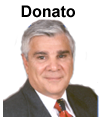Rep. Donato Supports Bill to Curb Healthcare Costs
 House Speaker Robert A. DeLeo and Chairman Steven Walsh of the Committee on Health Care Financing recently announced a comprehensive plan aimed at curbing health care costs and empowering patients.
House Speaker Robert A. DeLeo and Chairman Steven Walsh of the Committee on Health Care Financing recently announced a comprehensive plan aimed at curbing health care costs and empowering patients.
The bill, released by the Joint Committee on Health Care Financing, comes six years after Massachusetts passed the nation’s first universal health care law. The bill provides a responsible way to curb health care costs by attempting to build on existing incentives and market forces.
“Our goal with this bill has been to limit cost growth while maintaining high quality health care and innovation,†said House Speaker Robert A. DeLeo. “This bill is an economic development tool. Lowering health care costs will place Massachusetts in a stronger fiscal position for the future with the ability to maintain and attract jobs.â€
“Our current health care system rewards high-volume, expensive care that is not necessarily higher in quality,†said Chairman Steven Walsh, Joint Committee on Health Care Financing. “Under this legislation, providers will be incentivized to practice the best possible care at a reasonable price, and consumers will be provided with the necessary information to actively participate in making personal health care decisions. This bill strikes the right balance in controlling our rising health care costs while improving the quality of care that our patients receive.â€
“This bill is a measure to curb health care costs and at the same time provide quality careâ€, said Representative Paul J. Donato (D-Medford, Malden). “It is another effort by the House of Representatives to deal with the challenging issue of health care that we are presently struggling withâ€.
The bill empowers patients by giving them information they need to make informed decisions about health care. For the first time, patients will have online access to detailed comparative price and quality information, categorized by medical procedure, provider and payer. Likewise, it gives providers the cost and quality of health care services and patient-specific data to aid doctors in treating patients.
In preparing the bill, Chairman Walsh visited 54 hospitals, held 800 meetings with physicians, patients and others, and held high-level discussions with a dozen of the world’s most-renowned academic experts on the subject.
The bill comes as health care spending takes up a larger and larger percentage of the state’s budget; Premiums for a family average over $15,000 annually and each year health care costs comprise a greater percentage of our state budget.
The bill, among other things, also:
– Creates an electronic health record system to allow patients and providers readily accessible information. This will save money and improve quality;
– Establishes the Health Care Workforce Trust Fund to better prepare workers for the health care jobs of the future;
– Puts a premium on prevention and wellness (businesses are eligible for a $10K tax credit by establishing a wellness program);
– Simplifies payer coverage and claims information;
– Allows for providers to make use of an ‘apology’ provision to reduce litigation and cut costs;
– Streamlines health care governance bringing all state agencies under the Division of Health Care Cost and Quality;
– Sets a predictable goal for health care cost growth, Gross State Product -0.5% in three years;
– Facilitates the use of Accountable Care Organizations (ACOs) and Patient-Centered Medical Homes to improve treatment;
The bill now moves to the House Committee on Ways & Means.
– Information from State Representative Paul Donato (D-Medford, Malden)